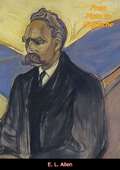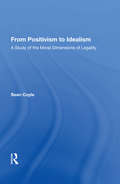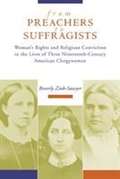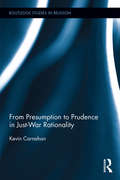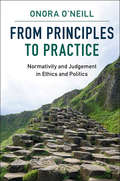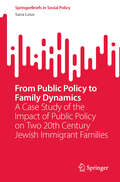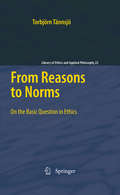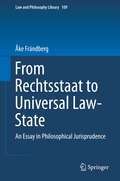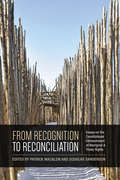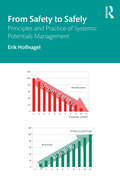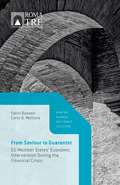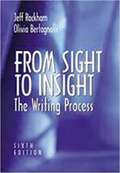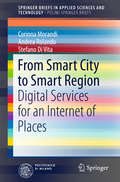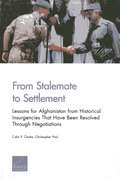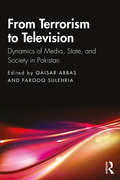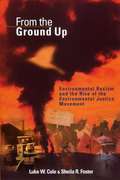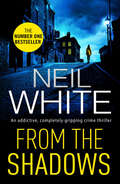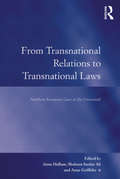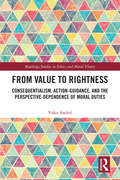- Table View
- List View
From Plato to Nietzsche
by E. L. AllenIDEAS THAT SHAPE OUR LIVESThis book is a clear, comprehensive guide to the philosophic and religious concepts of the world’s outstanding philosophers.Here are the great thoughts and ideas of the Western mind, selected and explained with magnificent precision by an eminent scholar.It is an illuminating portrait of man’s intellectual and moral struggle to understand the world and the meaning of human life and destiny.“Any intelligent student will have his appetite whetted by a study or perusal of this book.”—HIGHER EDUCATION JOURNAL
From Police to Security Professional: A Guide to a Successful Career Transition
by Michael S. D'AngeloFormer police and military personnel possess attractive skill sets for the private security industry; however, the transition to the corporate arena is not without challenges. Competition for these jobs is fierce. Many candidates possess degrees in security management‘some having spent their entire professional careers in private security. From Police to Security Professional: A Guide to a Successful Career Transition provides tips on overcoming the inherent obstacles law enforcement professionals face in making the switch and supplies a practical roadmap for entry into the private security world.The foundation of the book comes from the author‘s own journey and the many hurdles he encountered transitioning to private sector security. With his help, you‘ll learn: The unique skills, experience, and mentality required to enter into the private security industry from a law enforcement background The opportunities available and the different areas within the industry including benefits and income potential How to properly evaluate your training portfolio How to tailor your resume to garner the attention of hiring executives The many professional associations and certifications that could be helpful in your career Vital to your ability to succeed is understanding that security management has evolved into a distinct profession in its own right one that brings with it different education, experience, and skill sets that clearly differentiate it from law enforcement. This book will help you better understand and be prepared for the policies, processes, and a corporate environment that operates in a very different way than the police structure to which you are accustomed.
From Positivism to Idealism: A Study of the Moral Dimensions of Legality (Applied Legal Philosophy Ser.)
by Sean CoyleIlluminating the idea of legality by a consideration of its moral nature, this book explores the emergence and development of two rival traditions of legal thought (those of 'positivism' and 'idealism') which together define the structure of modern juridical thought. In doing so, it consciously departs from many of the tendencies and working assumptions that define modern legal philosophy. The book examines the shifts in thinking about the rule of law and the wider significance of law, brought about by changing conceptions of the nature of law: from an understanding of law in which the primary focus is on rights, to an articulation of the legal order as a body of deliberately posited rules, and finally to the present understanding of law as a systematic body of rules and principles underpinned by an abiding concern with individual rights. By exposing the historical and metaphysical underpinnings of these theoretical traditions, the book imparts an idea of their limitations and moves beyond the understandings offered within them of the nature of legality.
From Preachers to Suffragists: Woman's Rights and Religious Conviction in the Lives of Three Nineteenth-Century American Clergywomen
by Beverly Zink-SawyerThe women's rights movement in nineteenth-century America has primarily been interpreted as a secular movement. However, in From Preachers to Suffragists, Beverly Zink-Sawyer examines the lives of three nineteenth-century clergywomen--Antoinette Brown Blackwell, Olympia Brown, and Anna Howard Shaw--who, seeing their calling to the suffrage movement as an extension of their call to ministry, left the parish to join and become leaders in the movement. Zink-Sawyer tells the stories of their courageous lives, quoting their sermons and writings and tracing their struggles before and after ordination. In doing so, she persuasively demonstrates the vital importance of these leaders--of their religious rhetoric and their theological leadership--in shaping the movement as a whole, reclaiming its religious roots and making a major, even corrective, contribution to American history.
From Presumption to Prudence in Just-War Rationality (Routledge Studies in Religion)
by Kevin CarnahanFor the last several decades, the Just-War debate amongst theologians has been dominated by two accounts of moral rationality. One side assumes a presumption against harm (PAH), and the other identifies with a presumption against injustice (PAI). From Presumption to Prudence in Just-War Rationality argues that the time has come to leave behind these two viewpoints in favour of a prudentially grounded approach to Just-War thinking. In Parts 1 and 2 of the book, Kevin Carnahan offers immanent critiques of the PAI and PAH positions. In Part 3, utilising Paul’s treatment of the atonement and use of the idea of the imitation of Christ, he lays out an alternative to the ways in which theologians in favour of the PAI or PAH have construed the Christian narrative. In Part 4, Carnahan then develops a neo-Aristotelian account of prudence as a higher order virtue governing the interpretation of moral reality. Drawing on this account, he explores what Just-War rationality would look like if it were prudentially grounded. The work concludes with a case study on noncombatancy in the 2011 Israeli bombardment of Gaza. This book offers a compelling new perspective on this important and pertinent subject. As such, academics and students in Religion, Theology, Philosophy, Ethics and Political Theory will all find it an invaluable resource on Just-War theory.
From Principles to Practice: Normativity and Judgement in Ethics and Politics
by Onora O'NeillKnowledge aims to fit the world, and action to change it. In this collection of essays, Onora O'Neill explores the relationship between these concepts and shows that principles are not enough for ethical thought or action: we also need to understand how practical judgement identifies ways of enacting them and of changing the way things are. Both ethical and technical judgement are supported, she contends, by bringing to bear multiple considerations, ranging from ethical principles to real-world constraints, and while we will never find practical algorithms - let alone ethical algorithms - that resolve moral and political issues, good practical judgement can bring abstract principles to bear in situations that call for action. Her essays thus challenge claims that all inquiry must use either the empirical methods of scientific inquiry or the interpretive methods of the humanities. They will appeal to a range of readers in moral and political philosophy.
From Property To Family: American Dog Rescue And The Discourse Of Compassion
by Andrei S. Markovits Katherine N. CrosbyIn the wake of the considerable cultural changes and social shifts that the United States and all advanced industrial democracies have experienced since the late 1960s and early 1970s, social discourse around the disempowered has changed in demonstrable ways. In From Property to Family: American Dog Rescue and the Discourse of Compassion, Andrei Markovits and Katherine Crosby describe a "discourse of compassion" that actually alters the way we treat persons and ideas once scorned by the social mainstream. This "culture turn" has also affected our treatment of animals inaugurating an accompanying "animal turn". In the case of dogs, this shift has increasingly transformed the discursive category of the animal from human companion to human family member. One of the new institutions created by this attitudinal and behavioral change towards dogs has been the breed specific canine rescue organization, examples of which have arisen all over the United States beginning in the early 1980s and massively proliferating in the 1990s and subsequent years. While the growing scholarship on the changed dimension of the human-animal relationship attests to its social, political, moral and intellectual salience to our contemporary world, the work presented in Markovits and Crosby's book constitutes the first academic research on the particularly important institution of breed specific dog rescue.
From Protagoras to Aristotle: Essays in Ancient Moral Philosophy
by Heda SegvicThis is a collection of the late Heda Segvic's papers in ancient moral philosophy. At the time of her death at age forty-five in 2003, Segvic had already established herself as an important figure in ancient philosophy, making bold new arguments about the nature of Socratic intellectualism and the intellectual influences that shaped Aristotle's ideas. Segvic had been working for some time on a monograph on practical knowledge that would interpret Aristotle's ethical theory as a response to Protagoras. The essays collected here are those on which her reputation rests, including some that were intended to form the backbone of her projected monograph. The papers range from a literary study of Homer's influence on Plato's Protagoras to analytic studies of Aristotle's metaphysics and his ideas about deliberation. Most of the papers reflect directly or indirectly Segvic's idea that both Socrates' and Aristotle's universalism and objectivism in ethics could be traced back to their opposition to Protagorean relativism. The book represents the considerable achievements of one of the most talented scholars of ancient philosophy of her generation.
From Public Policy to Family Dynamics: A Case Study of the Impact of Public Policy on Two 20th Century Jewish Immigrant Families (SpringerBriefs in Social Policy)
by Sana LoueThis compact book relies on the story of two intertwined Jewish immigrant families to tell a multigenerational Jewish story about the interplay between public/social policy, cultural categories, and the lived experience of working class immigrant Jews from Eastern Europe, including trans-/intergenerational trauma. Importantly, it focuses on the impacts of pre-Holocaust public policy, a significant departure from the Holocaust and post-Holocaust focus of much of the published literature relating to Jewish intergenerational trauma. As such, it offers the possibility of better understanding the far-reaching and perhaps unforeseen impacts of public policy. This book addresses events on both the micro and macro levels and is biographical, autobiographical, and historical in its scope. Sources for this work include archival materials, census records, maps, military records, birth and death certificates, congressional materials, newspaper articles, films, images, interviews with living family members, and secondary sources. Among the topics covered are: Russian, Soviet, and U.S. Eugenics: Family Internalization of Policy and Rhetoric The Intertwined Impact of Economics, Eugenic Policy, and Immigration Restrictions The Present Past: Policy, Identity, and Progeny From Public Policy to Family Dynamics: A Case Study of the Impact of Public Policy on Two 20th Century Jewish Immigrant Families adds a human face to writings related to public/social policy. As the book integrates understandings from diverse fields of study, students of public policy, social work, psychology, history, Jewish studies, immigration studies, bioethics, and public health, as well as social workers, bioethicists, and historians, would be most interested in reading this unique work.
From Reasons to Norms
by Torbjörn TännsjöThis book originated from a discussion between the author, Derek Parfit and Wlodek Rabinowicz, and further developed in correspondence and intense discussions with Wlodek Rabinowics and John Broome. The author disputes the recent trend in metaethics that focuses on reasons rather than norms. The reader is invited to take a new look at the traditional metaethical questions of moral semantics, ontology, and epistemology. The author mainly concerns himself with particular aspects of these problems: Which are the problems of morality? Are there many different moral questions, or, do they all, in the final analysis, reduce to one? The bold claim made in this book is that there is just one: What ought to be done? Moreover, there is just one source of normativity, just one kind of 'ought'-question, which lends itself to an objectively correct and authoritative answer.
From Rechtsstaat to Universal Law-State
by Åke FrändbergIn this book the author investigates what is common to the German idea of the Rechtsstaat and the Anglo-American idea of the Rule of Law. He argues that, although dressed up in rather different garb, these two concepts are in fact based on the same fundamental idea and stand for the same values ("the law-state values") - all ideas that are in the European tradition older than their British and German variants. The fundamental idea is that the individual shall enjoy legal protection against infringements brought about by the exercise of power on the part of the state. In the book basic concepts such as legality, legal equality, legal certainty, legal accessibility and legal security are investigated. Also explored are their mutual relations, in particular, conflicts between them. Furthermore, the book offers practical advice on realising and sustaining these values in practice. Finally, it is argued that the characteristic law-state values can only be justified by reference to an even more fundamental humanistic idea, namely, what the author calls "a life of human dignity".
From Recognition to Reconciliation: Essays on the Constitutional Entrenchment of Aboriginal and Treaty Rights
by Patrick Macklem Douglas SandersonMore than thirty years ago, section 35 of the Constitution Act recognized and affirmed "the existing aboriginal and treaty rights of the aboriginal peoples of Canada." Hailed at the time as a watershed moment in the legal and political relationship between Indigenous peoples and settler societies in Canada, the constitutional entrenchment of Aboriginal and treaty rights has proven to be only the beginning of the long and complicated process of giving meaning to that constitutional recognition.In From Recognition to Reconciliation, twenty leading scholars reflect on the continuing transformation of the constitutional relationship between Indigenous peoples and the Canadian state. The book features essays on themes such as the role of sovereignty in constitutional jurisprudence, the diversity of methodologies at play in these legal and political questions, and connections between the Canadian constitutional experience and developments elsewhere in the world.
From Safety to Safely: Principles and Practice of Systemic Potentials Management
by Erik HollnagelThe conventional interpretation of safety, known as Safety-I, denotes a condition where as little as possible goes wrong, and the focus of practical efforts in management or analysis is on the occurrence of unacceptable outcomes and on how to reduce their number to an acceptable level, ideally zero. The emphasis is therefore on how to manage safety as such, as seen in the ubiquitous safety management systems (SMS). As Professor James Reason astutely points out, this raises the interesting question of how it is possible to learn about something, let alone manage it, if it is studied only in situations in which it is absent. The solution proposed by and described in this book is to stop using safety as a noun and instead use it as an adverb: safely.Now often referred to as Safety-II, this solution is the logical consequence of resilience engineering and will require new methods, several of which already exist and have proved their worth in practice for years. The question ceases being what to manage and becomes how to manage. Managing safety is protective, hence a non-productive cost, which at best avoids a loss. Conversely, managing safely is productive and can generate revenue in addition to preventing or avoiding losses; aviation and mining are prime examples.From Safety to Safely provides a practical perspective on managing safely, illustrating a practical form of synesis. It offers a new understanding of safety, combining concerns for productivity and safety rather than juxtaposing them, and it shows how to manage complex industrial and social systems in the spirit of resilience engineering and synesis. It is the first book to completely dispense with the loaded term "safety" while offering a practical and viable alternative. Spoiler alert: this book does not mention or analyse any celebrated accidents.This book is for all middle and senior managers, board members, and independent consultants seeking to ensure safe, revenue-generating operations.
From Saviour to Guarantor: EU Member States’ Economic Intervention During the Financial Crisis (Roma Tre Business and Finance Collection)
by Fabio Bassan Carlo D. MotturaState guarantees commonly function as financial panacea, allowing states to consolidate banking systems and create intergovernmental funds. Rules surrounding state guarantees were relaxed during the 2007-2008 financial crisis, allowing states to use them for financing small and medium-sized enterprises (SMEs) and workers' severance payments. Despite many multi-level interventions in many areas after the financial crisis, from international treaties to EU regulations, no specific regulation has been put in place to control state guarantees. This book addresses the subject of state guarantees in the Eurozone, and questions the stability of the instruments implemented so far by states and by the European Union. Using a methodology combining law and finance, it examines the tools adopted by European institutions and Member States in the EU's evolving institutional context, in order to evaluate the effectiveness of the tools themselves as well as of the new European institutional framework. It also addresses the unconventional measures adopted by the European Central Bank, its role as safeguard for European state guarantees and its interaction with the European Union and national courts. In From Saviour to Guarantor the authors suggest that the absence of specific regulatory interventions and the variety and vagueness of existing rules has resulted in state guarantees further destabilising public international finance.
From Sight to Insight
by Olivia Bertagnolli Jeff RackhamPraised for its accessible tone, early attention to process, and hundreds of examples, this brief rhetoric/reader guides students through eight different writing projects.
From Single Mom to Secret Heiress
by Kristi GoldWhere there's a will, there's a secret... When Hannah Armstrong opens the door to find a cowboy on her porch, her jaw drops-and not just because he's beyond handsome. Apparently she's heir to the Lassiter fortune. If Logan Whittaker, cowboy-turned-attorney, can help her uncover the truth about her biological father, why say no-at least for her daughter Cassie's sake? With Hannah tucked away at his ranch house, Logan longs to turn their business affairs into something more personal. Except Hannah has enough dark family secrets to cope with-and Logan's own past could spell trouble just as things are really heating up....
From Smart City to Smart Region
by Corinna Morandi Andrea Rolando Stefano Di VitaThis book offers a fascinating exploration of the relationship between information and communication technologies (ICTs) and spatial planning, expanding the concept of "urban smartness" from the usual scale of buildings or urban projects to the regional dimension. In particular, it presents the outcomes of research undertaken at Politecnico di Milano, in collaboration with Telecom Italia, that had three principal goals: to investigate the use of ICTs for the representation, promotion, management, and dissemination of an integrated system of services; to explore the spatial impacts of digital services at different scales (regional, urban, local); and to understand how a system of mobile services can encourage new spatial uses and new collective behavior in the quest for better spatial quality of places. Useful critical analysis of international case studies is also included with the aim of verifying the opportunities afforded by new digital services not only to improve the urban efficiency but also to foster the evolution of urban communities through enhancement of the public realm. The book will be a source of valuable insights for both scholars and local administrators and operators involved in smart city projects.
From Stalemate to Settlement: Lessons for Afghanistan from Historical Insurgencies That Have Been Resolved Through Negotiations
by Christopher Paul Colin P. ClarkeA comprehensive review of historical insurgencies that ended in settlement after a military stalemate shows that these negotiations followed a similar path that can be generalized into a "master narrative" of seven steps executed in a common sequence. Such a narrative could help guide and assess the progress of a similar approach to resolving the conflict in Afghanistan as U. S. forces prepare to withdraw.
From Stalemate to Settlement: Lessons for Afghanistan from Historical Insurgencies That Have Been Resolved Through Negotiations
by Christopher Paul Colin P. ClarkeA comprehensive review of historical insurgencies that ended in settlement after a military stalemate shows that these negotiations followed a similar path that can be generalized into a "master narrative" of seven steps executed in a common sequence. Such a narrative could help guide and assess the progress of a similar approach to resolving the conflict in Afghanistan as U. S. forces prepare to withdraw.
From Sugar to Splenda
by Bert Fraser-ReidMore than just coincidence connects a Tate & Lyle lawsuit and artificial sweetener to Jamaican-born Chemist Bert Fraser-Reid. From his first experience of Chemistry through his diabetic father, to his determination and drive as a Chemistry student in Canada, Fraser-Reid weaves a remarkable tale integrating science, law and autobiographical anecdotes. This book arises from the lawsuit brought by Tate & Lyle against companies accused of infringing its patents for sucralose, the sweet ingredient in the artificial sweetener SPLENDA which is made by chlorinating sugar. From a 1958 undergraduate intern witnessing the pioneering experiments on sugar chlorination, to being the 1991 recipient of the world's premiere prize for carbohydrate chemistry, Fraser-Reid was groomed for his role as expert witness in the mentioned lawsuit. Nevertheless, it seems more than his career links Fraser-Reid to the case.
From Terrorism to Television: Dynamics of Media, State, and Society in Pakistan
by Qaisar AbbasThis book unpacks the media dynamics within the socio-cultural, political, and economic context of Pakistan. It provides an in-depth, critical, and scholarly discussion of contemporary issues such as media, state, and democracy in Pakistan; freedom of expression in Pakistani journalism; Balochistan as a blind spot in mainstream newspapers; media control by state institutions; women and media discourses; TV talk shows and coverage of Kashmir; feminist narrative and media images of Malala Yousufzai and Mukhtaran Mai; jihad on screen; and Osama bin Laden’s death on screen, to understand the relation between media and terrorism. The book covers diverse media types including TV, radio, newspapers, print media, films, documentary, stage performance, and social media. Detailed, interdisciplinary, analytical, and with original perspectives from journalists as well as academics, this volume will be useful to scholars and researchers of media studies, Pakistan studies, politics and international affairs, military and terrorism studies, journalism and communication studies, and South Asian studies. It will also interest general readers, policy makers, and those interested in global journalism, mass media, and freedom of expression.
From The Ground Up: Environmental Racism and the Rise of the Environmental Justice Movement
by Luke W. Cole Sheila R. FosterWhen Bill Clinton signed an Executive Order on Environmental Justice in 1994, the phenomenon of environmental racism--the disproportionate impact of environmental hazards, particularly toxic waste dumps and polluting factories, on people of color and low-income communities--gained unprecedented recognition. Behind the President's signature, however, lies a remarkable tale of grassroots activism and political mobilization. Today, thousands of activists in hundreds of locales are fighting for their children, their communities, their quality of life, and their health. From the Ground Up critically examines one of the fastest growing social movements in the United States, the movement for environmental justice. Tracing the movement's roots, Luke Cole and Sheila Foster combine long-time activism with powerful storytelling to provide gripping case studies of communities across the U. S--towns like Kettleman City, California; Chester, Pennsylvania; and Dilkon, Arizona--and their struggles against corporate polluters. The authors effectively use social, economic and legal analysis to illustrate the historical and contemporary causes for environmental racism. Environmental justice struggles, they demonstrate, transform individuals, communities, institutions and even the nation as a whole.
From The Shadows (Dan Grant and Jayne Brett Series)
by Neil WhiteTo prove his client&’s innocence, a lawyer and his investigator must endanger themselves to find the true killer in this gripping legal thriller. Twenty-four-year-old Mary Kendricks is a vivacious, young teacher living in the quiet Northern town of Highford, her beauty turning heads wherever she goes. But when she catches the eye of Robert Carter, initial flattery quickly turns dangerous. Wherever she goes, Carter is not far behind, and Mary soon becomes stifled by his attention, telling friends of her fears that he&’s getting too close. And then Mary&’s body is discovered, stabbed to death in her own bedroom. The case quickly garners the attention of the press, all baying for Carter&’s blood. It&’s the case no lawyer wants to touch—until criminal defence lawyer Dan Grant, aided by investigator Jayne Brett, agrees to represent Carter. While Robert Carter admits to being at her house when it happened—the bloody fingerprint on her wall placing him at the scene—he insists he is innocent of her death. The police believe they&’ve got their man, but as they delve further into the investigation, Grant and Brett think the detectives might be looking in the wrong place—leaving the real murderer to walk free. To catch a killer before another victim is discovered, Brett and Grant must risk everything. Including their own lives . . . If you like Val McDermid or John Grisham you won&’t want to miss this book.Praise for the writing of Neil White&“One of the best writers of legal thrillers out there.&” —David Jackson, author of Don&’t Make A Sound and A Tapping At My Door&“A tense and exciting crime thriller.&” —Rachel Abbott, author of Sleep Tight and And So It Begins&“I couldn't put it down.&” —Gillian McAllister, Sunday Times–bestselling author of Everything But the Truth
From Transnational Relations to Transnational Laws: Northern European Laws at the Crossroads (Law, Justice And Power Ser.)
by Anne Griffiths Shaheen Sardar AliThis book approaches law as a process embedded in transnational personal, religious, communicative and economic relationships that mediate between international, national and local practices, norms and values. It uses the concept "living law" to describe the multiplicity of norms manifest in transnational moral, social or economic practices that transgress the territorial and legal boundaries of the nation-state. Focusing on transnational legal encounters located in family life, diasporic religious institutions and media events in countries like Norway, Sweden, Britain and Scotland, it demonstrates the multiple challenges that accelerated mobility and increased cultural and normative diversity is posing for Northern European law. For in this part of the world, as elsewhere, national law is challenged by a mixture of expanding human rights obligations and unprecedented cultural and normative pluralism enhanced by expanding global communication and market relations. As a consequence, transnationalization of law appears to create homogeneity, fragmentation and ambiguity, expanding space for some actors while silencing others. Through the lens of a variety of important contemporary subjects, the authors thus engage with the nature of power and how it is accommodated, ignored or resisted by various actors when transnational practices encounter national and local law.
From Value to Rightness: Consequentialism, Action-Guidance, and the Perspective-Dependence of Moral Duties (Routledge Studies in Ethics and Moral Theory)
by Vuko AndrićThis book develops an original version of act-consequentialism. It argues that act-consequentialists should adopt a subjective criterion of rightness. The book develops new arguments which strongly suggest that, according to the best version of act-consequentialism, the rightness of actions depends on expected rather than actual value. Its findings go beyond the debate about consequentialism and touch on important debates in normative ethics and metaethics. The distinction between criterion of rightness and decision procedures addresses how, why, and in which sense moral theories must be implemented by ordinary persons. The discussion of the rationales of "ought" implies "can" leads to the discovery of a hitherto overlooked moral principle, "ought" implies "evidence", which can be used to show that most prominent moral theories are false. Finally, in the context of discussing cases that are supposed to reveal intuitions that favour either objective or subjective consequentialism, the book argues that which cases are relevant for the discussion of objectivism and subjectivism depends on the type of moral theory we are concerned with (consequentialism, Kantianism, virtue ethics, etc.). From Value to Rightness will be of interest to scholars and advanced students working in normative ethics and metaethics.
